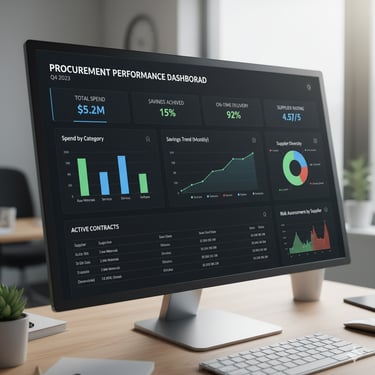Procurement 101: A Beginner's Guide for Small Business Owners
📊 Small businesses waste 15-30% of their purchasing budget through inefficient procurement.
Running a small business means wearing many hats, and procurement is one that often gets overlooked until something goes wrong: a delayed shipment, an unexpected price increase, a supplier who suddenly can't deliver. Sound familiar? If you've been managing your business purchases through scattered emails, verbal agreements, and "we'll figure it out as we go," you're not alone. But here's the thing: poor procurement practices are quietly draining thousands from your bottom line every year.
This guide breaks down everything you need to know about procurement in plain language, without the corporate jargon.
What Is Procurement, Really?
"Let's start simple. Procurement is the complete process of acquiring goods and services your business needs to operate. It's not just "buying stuff." It includes:
Identifying what you need, finding reliable suppliers, and negotiating prices.
Why Procurement Matters for Small Businesses
"I'm too small to worry about formal procurement processes."
I hear this all the time. But here's the reality: Small businesses actually benefit MORE from good procurement practices than large corporations.
Here's why
You have less room for error: When working with tight margins, overpaying by even 10-15% on suppliers can seriously impact profitability.
Cash flow is critical: Unexpected expenses or late deliveries can create cash flow problems that threaten your entire operations. Strategic procurement prevents these surprises.
Your Time is Valuable: Every hour you spend chasing suppliers or fixing ordering mistakes is an hour you're not spending on growing your business.
Supplier Relationship Management: As a small buyer, you need strong relationships with suppliers who will prioritize your orders, offer flexible terms, and support you during challenges.
The 7 Core Elements of Procurement
Needs Identification: Before buying, ask yourself, What exactly do we need? How much is required? When do we need it? And what are the quality standards?
Quick Win: Create a simple inventory tracking system (even a spreadsheet works) to monitor stock levels and identify reorder points before you run out
Supplier research and selection: Not all suppliers are created equal. Look for reliability , quality , pricing , terms, and support .
Quick Win: Maintain a list of at least 2-3 backup suppliers for critical items. This prevents panic when your primary supplier has a problem
Price Negotiation: Many small business owners accept the first price quoted. Don't. Ask for volume discounts, request better payment terms, bundle multiple items for better pricing, and build a long-term relationship for loyalty pricing.
Quick Win: Before agreeing to any price, always ask: "Is this your best price?" or "What can you do for me on pricing?" You'll be surprised how often suppliers have flexibility.
Purchase Orders (POs): A purchase order is a formal document that confirms what you're buying, how much, at what price, and when you need it delivered.
Why POs matter: Creates a paper trail, prevents miscommunication, protects you legally, helps with budget tracking, and makes invoice reconciliation easier. Quick Win: Even if you're not using fancy software, create a simple PO template in Word or Excel :
Order Tracking & Delivery Management: Once you've placed an order, stay on top of it: Confirm receipt of your PO with the supplier, track expected delivery dates, follow up if shipments are delayed, inspect deliveries for quality and accuracy, and document any issues immediately.
Quick Win: Set calendar reminders for expected delivery dates. If you haven't received tracking info 2 days before, contact your supplier.
Invoice Processing & Payment: Match three things before paying any invoice: This is called "3-way matching," and it prevents overpayment, duplicate billing, and fraud.
Purchase Order: What you agreed to buy
Delivery Receipt: What you actually received
Invoice: What the supplier is charging you
Quick Win: Create a simple folder system (physical or digital) with these three categories. Don't approve payment until all three documents match
Supplier Relationship Management: Your suppliers aren't just vendors, they're business partners.
Quick Win: Schedule quarterly check-ins with your key suppliers. Ask how you can be a better customer and what's coming in their industry that might affect you.
Ready to Take Control of Your Procurement?
Let's talk about your procurement challenges.
Don't forget to connect with me on social media using the link below

